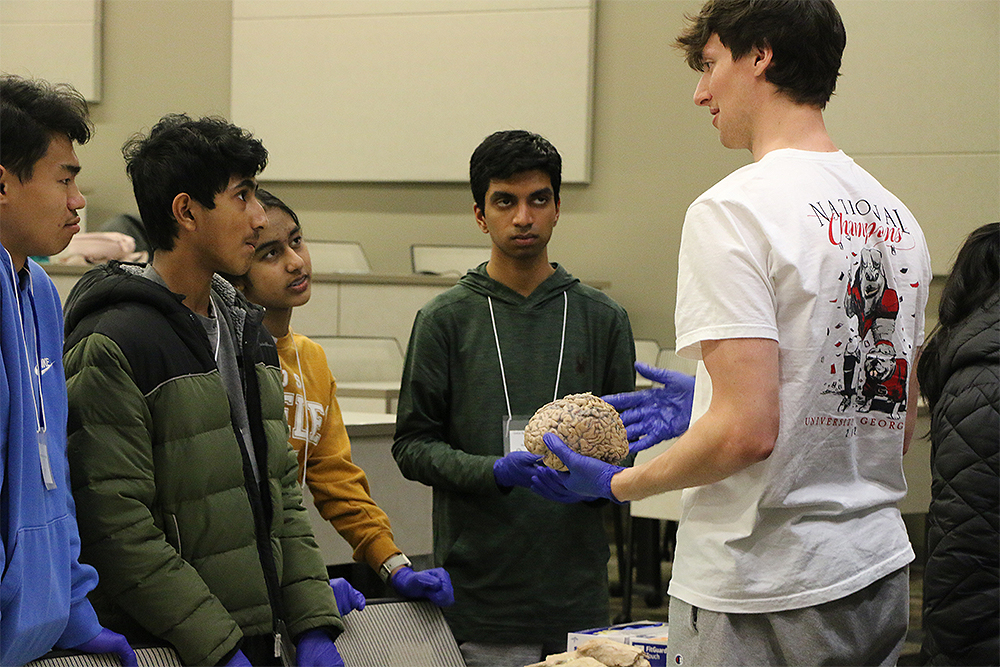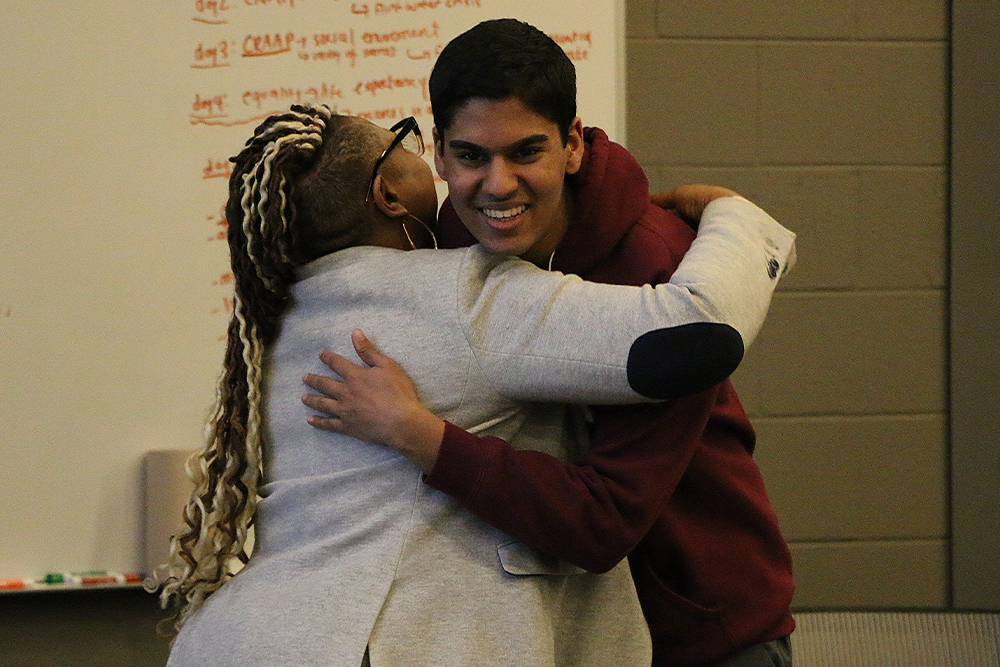
High school students from metro Detroit recently learned about the intersection between the environment and health during OUWB’s 2023 Online Spring Enrichment Program called “The Environment, Health, and You”.
The program was free and open to all high school students with interest in medicine and medicine-related careers. The sessions took place March 27-31 with more than 20 participants from area high schools.
The program is coordinated by Diversity & Inclusion and facilitated by faculty from the Department of Foundational Medical Studies with support from volunteer OUWB medical students.
“Everyone comes in at their own level of knowledge and expectations,” said Tiffany Williams, Ph.D., director, Diversity & Inclusion.
“We’re hoping to create an experience that provides exposure to careers in medicine and health sciences…whether it’s (through) creating a deep understanding of a specific topic or connecting with our faculty, staff, and our students.”
An accessible learning opportunity
Four of the five sessions were held in an online format, where students learned from FMS faculty about topics such as how to utilize the Currency, Reliability, Authority, Purpose/Point-of-View test to determine source validity, how to test water, and nutrition.
The last online session on March 30 focused on the social determinants of health and how they impact environmental health.
The program was originally designed in response to the COVID-19 pandemic to replace a fully in-person program OUWB.
However, in 2023, the continuation of online sessions provided a way to engage with high school students that may otherwise be unable to attend in-person meetings.
“It’s worked out well, especially when we talk about barriers to access to students in terms of participation,” said Williams.
Scientific spring break
 |
| Tonya Bailey, Ph.D., associate dean, Diversity & Inclusion and Community Engagement, hugs one of the high schoolers who completed the program |
The final session of the program was held in-person on Oakland University’s campus.
The day-long event began with a welcome and breakfast before transitioning into group presentations with their peers, which they had been working on collaboratively throughout the week.
The topics included food insecurity, access to clean drinking water, healthy eating, and lead exposure.
Then, some volunteer medical students taught students about anatomy using specimens from the Anatomy Lab — including a real human brain and heart.
Following lunch, the medical students led the participants on a tour of OUWB’s campus, including O’Dowd Hall, the Oakland Center, the Anatomy Lab, and the Medical Library.
Finally, selected faculty, staff, and physicians participated in a panel to discuss their careers and their advice to high school students that want to pursue medicine.
Panelists included Associate Dean for Clinical Education Pierre Morris, M.D., Vice Dean for Business and Administration Steve Collard, Director of Population Health Informatics Ramin Homayouni, Ph.D., and University of Michigan postdoctoral fellow Rebecca Shill, Ph.D.
Some of the topics that were discussed were the importance of strong mentors, what it takes to be a medical school candidate, and how the panelists found their careers.
“The most influential part of your career will be the people that you meet, and I’ve had good mentors and bad mentors,” said Shill. “And the key is to take away what you like from each person and build yourself upon that. You’re not them…you’re going to be you.”
Medical students Doria Morante, M1, and Cloe Nazeer, M2, also led a round table to discuss their perspective on what it was like to be in medical school and their journeys to get there.
For Morante, she wanted to help answer student questions the same way someone else did for her prior to medical school.
“I actually did this exact same program but it was a summer program for two weeks in-person, right after I graduated high school,” said Morante. “I remember how much I enjoyed the program and I wanted to come back and give back as a medical student now.”
“I really hope that they got all of their questions answered and can see how great of a school OUWB is and how we emphasize community.”
‘Race to the finish’
The program ended with a wrap-up where students were asked to write down a career that they were interested in and reflect on what they now knew that they didn’t know before the sessions.
The students mentioned a large variety of medical careers they were interested in, including surgery, environmental biology, neurology, ophthalmology, and oncology.
Students then were asked to write what they didn’t know at the start of the program versus what they know now. Some of the responses included a deeper understanding on genetics, the environment, and research.
Brianne Lewis, Ph.D., associate professor, said that she was “moved” by the students’ participation in the program and the reflections she saw them make.
“It was a bit of a race to the finish…the students were so engaged throughout the week,” she said. “It was great to be with them in person… (they were) really drawing connections from those basic founding principles and applying that to real life scenarios.”
Lewis added that she hopes students came away with interest in medical careers, especially those that they talked about in the sessions that the students may not have otherwise known about related to environmental health and public health.
“I hope that they’re able to really understand what it takes to become a physician, (because) many of the students said they wanted to pursue that career option,” she said.
“But there’s other career options available to them, and maybe it was the first time they had exposure to that, and maybe they hadn’t considered that.”
Peter Chu, junior, Troy Athens High School, is one such student interested in the medical field, specifically biomedical engineering, a field that was talked about during the career panel.
He added that through these sessions, he learned about how while human health is impacted by an individual’s own behaviors, the environment has a massive role as well.
“My main takeaway from this is that the environment plays a bigger role in our health than we initially thought it was,” said Chu. “Most of the time, we associate health as our own intake, but not our general surroundings.”
“The nature of the environment is also really important,” he added. “Even our supply, like food and water, are also major aspects in what makes us us and how healthy we are.”
Peter Bungart, junior, St. Mary's Preparatory High School, said that the sessions intensified his interest in the medical field.
“I’m definitely interested after doing this,” he said. “(After) talking with the professors and the medical students, I see myself doing this for sure.”
To request an interview, visit the OUWB Communications & Marketing webpage.
This work is licensed under a Creative Commons Attribution-NonCommercial 4.0 International License.

